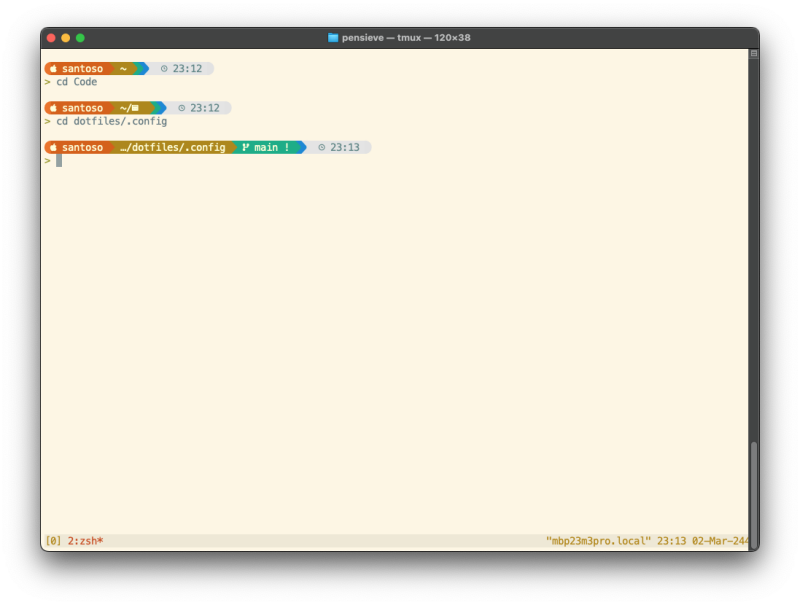Solarized Starship

I just discovered Starship, a Rusty terminal cross-shell prompt with tons of customization options.
Installation
Installation is easy with Homebrew.
brew install starship
Installing Nerd Fonts
The prompt heavily utilizes extended unicode glyphs that are available in the Nerd Fonts patched fonts set. Installing an NF-patched Meslo font, for instance, can be done easily on a Mac OS with Homebrew.
brew tap homebrew/cask-fonts
brew install --cask font-meslo-lg-nerd-font
Then, we need to use that font in our Terminal or VSCode apps. For Terminal.app, I find that “MesloLGS Nerd Font” works best. For VSCode, I am trying out “MonaspiceNe Nerd Font” (based on GitHub’s latest Monaspace font family) at the moment.
TODO: I need to also use this font for this site. Using the system font default, these glyphs will not be able to render properly.
Configuring Starship
I really like the Gruvbox Rainbow preset as a base.
starship preset gruvbox-rainbow -o ~/.config/starship.toml
But I want to Solarize it. So I tweaked its palette, and ended up with this
starship.toml file.
"$schema" = 'https://starship.rs/config-schema.json'
format = """
[](sol_orange)\
$os\
$username\
[](bg:sol_yellow fg:sol_orange)\
$directory\
[](fg:sol_yellow bg:sol_cyan)\
$git_branch\
$git_status\
[](fg:sol_cyan bg:sol_blue)\
$c\
$rust\
$golang\
$nodejs\
$php\
$java\
$kotlin\
$haskell\
$python\
[](fg:sol_blue bg:base2)\
$docker_context\
[](fg:base2 bg:base2)\
$time\
[ ](fg:base2)\
$line_break$character"""
palette = 'solarized_light'
[palettes.solarized_light]
# background and content tones:
# # DARK MODE | LIGHT MODE
base03 = '#002b36' # background | -
base02 = '#073642' # background highlights | -
base01 = '#586e75' # comments | opt. emph. content
base00 = '#657b83' # - | primary content
base0 = '#839496' # primary content | -
base1 = '#93a1a1' # opt. emph. content | comments
base2 = '#eee8d5' # - | background highlights
base3 = '#fdf6e3' # - | background
# accent colors:
sol_yellow = '#b58900'
sol_orange = '#cb4b16'
sol_red = '#dc322f'
sol_magenta = '#d33682'
sol_violet = '#6c71c4'
sol_blue = '#268bd2'
sol_cyan = '#2aa198'
sol_green = '#859900'
# Note that for tones, the normal relationship for background and body text
# is `base03:base0` for dark mode and `base3:base00` for light mode.
# Notice the "flipping" of leading 0?
[os]
disabled = false
style = "bg:sol_orange fg:base3"
[os.symbols]
Macos = ""
Ubuntu = ""
Windows = ""
SUSE = ""
Raspbian = ""
Mint = ""
Manjaro = ""
Linux = ""
Gentoo = ""
Fedora = ""
Alpine = ""
Amazon = ""
Android = ""
Arch = ""
Artix = ""
CentOS = ""
Debian = ""
Redhat = ""
RedHatEnterprise = ""
[username]
show_always = true
style_user = "bg:sol_orange fg:base3"
style_root = "bg:sol_orange fg:base3"
format = '[ $user ]($style)'
[directory]
style = "bg:sol_yellow fg:base3"
format = "[ $path ]($style)"
truncation_length = 3
truncation_symbol = "…/"
[directory.substitutions]
"Documents" = " "
"Downloads" = " "
"Music" = " "
"Pictures" = " "
"Code" = " "
"workspace" = " "
[git_branch]
symbol = ""
style = "bg:sol_cyan"
format = '[[ $symbol $branch ](fg:base3 bg:sol_cyan)]($style)'
[git_status]
style = "bg:sol_cyan"
format = '[[($all_status$ahead_behind )](fg:base3 bg:sol_cyan)]($style)'
[nodejs]
symbol = ""
style = "bg:sol_blue"
format = '[[ $symbol( $version) ](fg:base3 bg:sol_blue)]($style)'
[c]
symbol = " "
style = "bg:sol_blue"
format = '[[ $symbol( $version) ](fg:base3 bg:sol_blue)]($style)'
[rust]
symbol = ""
style = "bg:sol_blue"
format = '[[ $symbol( $version) ](fg:base3 bg:sol_blue)]($style)'
[golang]
symbol = ""
style = "bg:sol_blue"
format = '[[ $symbol( $version) ](fg:base3 bg:sol_blue)]($style)'
[php]
symbol = ""
style = "bg:sol_blue"
format = '[[ $symbol( $version) ](fg:base3 bg:sol_blue)]($style)'
[java]
symbol = " "
style = "bg:sol_blue"
format = '[[ $symbol( $version) ](fg:base3 bg:sol_blue)]($style)'
[kotlin]
symbol = ""
style = "bg:sol_blue"
format = '[[ $symbol( $version) ](fg:base3 bg:sol_blue)]($style)'
[haskell]
symbol = ""
style = "bg:sol_blue"
format = '[[ $symbol( $version) ](fg:base3 bg:sol_blue)]($style)'
[python]
symbol = ""
style = "bg:sol_blue"
format = '[[ $symbol( $version) ](fg:base3 bg:sol_blue)]($style)'
[docker_context]
symbol = ""
style = "bg:base2"
format = '[[ $symbol( $context) ](fg:#83a598 bg:base2)]($style)'
[time]
disabled = false
time_format = "%R"
style = "bg:base3"
format = '[[ $time ](fg:base00 bg:base2)]($style)'
[line_break]
disabled = false
[character]
disabled = false
success_symbol = '[>](bold fg:sol_green)'
error_symbol = '[>](bold fg:sol_red)'
vimcmd_symbol = '[<](bold fg:sol_green)'
vimcmd_replace_one_symbol = '[<](bold fg:sol_violet)'
vimcmd_replace_symbol = '[<](bold fg:sol_violet)'
vimcmd_visual_symbol = '[<](bold fg:sol_yellow)'
Neat!
